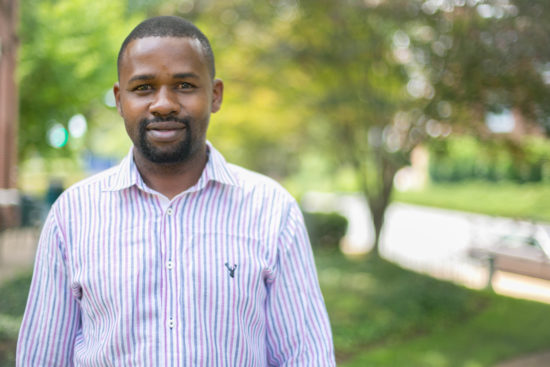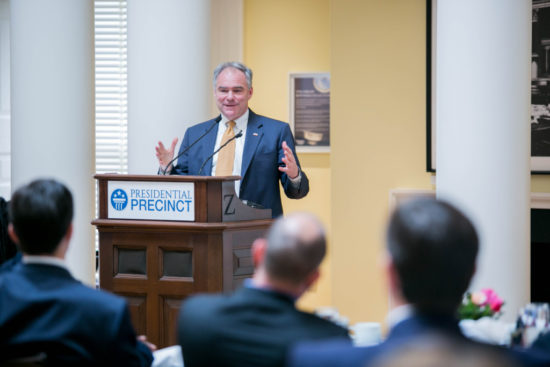
Dzikamai Bere from Zimbabwe, 2017 Mandela Washington Fellow (Credit: Presidential Precinct)
This June, Global Ties U.S. member Presidential Precinct in Charlottesville, Virginia welcomed the 2017 Mandela Washington Fellows (MWF) for Young African Leaders. The opening featured Senator Tim Kaine of Virginia and Ben Rhodes, former Deputy National Security Advisor for Strategic Communications for President Barack Obama.
The highly competitive Fellowship is the U.S. Department of State flagship program of the Young African Leaders Initiative (YALI). Presidential Precinct hosts a six-week Civic Leadership Institute oriented toward Fellows who are serving the public through non-governmental organizations, community based organizations, or volunteerism. Read this testimonial on how Presidential Precinct is making an impact in the community and abroad.
Monday, June 19 marked the official kick off the Mandela Washington Fellowship at the Presidential Precinct in Charlottesville, Virginia. It is a very personal journey for me and what an amazing place to be – evincing the full power of place, the full power of ideas.
LEAD IN TRUTH, LEAD WITH INTEGRITY
The opening started with a warm welcome by Teresa Sullivan, President of the University of Virginia. She is an outstanding and inspirational leader who challenged the young leaders to lead with integrity. She said, “you have to recover those parts of history that you are not proud of,” in reference to the ugly history of slavery in Virginia and the work that the University is doing to build a memorial for African Americans whose lives and dignity were sacrificed in building the United States. This touched me because of my work in Zimbabwe with the National Transitional Justice Working Group (NTJWG) in pushing for a comprehensive dealing with the past framework. It is not easy for a government accused of massive violations to have the courage to confront its own record and right it.
KEEP SEARCHING, KEEP GOING FURTHER
The address by President Sullivan was followed by a roundtable discussion with Darden School of Business Professor Greg Fairchild who challenged the Fellows to reflect on why they were in the United States for the Fellowship. I shared that the Fellowship is an “opportunity to step back, and learn from others, reflect on the lessons I learned and perhaps refine my own philosophy on how I see paths to the solutions to the wicked problems that I work on every day of my life in Zimbabwe.” Rebecca Ojedele from Nigeria said she wants her “work to go beyond me.”
Over the following few days, we learned what wicked problems Africa faces and were introduced to various tools to tackle them – for example, leadership as the art to getting things done with Dr. Allan Stan and design thinking with Malik Vaughan.
IT IS NOT EASY TO SING ALONE.
Professor Fairchild also asked a fundamental question: “How many of you ever felt alone, and in the work that you are doing, you are like a voice in the wilderness?”
It is not easy to sing alone, however when like-minded people from different parts of Africa come together, they are seeking other lone voices so that in hearing other voices, their own voices may be enhanced and reach further – the main purpose being to make a difference in Africa and the world. As Landa Mabenge from South Africa put it, we needed to connect with each other and to learn from each other. I call it “connecting struggles!”

Senator Tim Kaine (VA) (Credit: Presidential Precinct)
ANSWERING THE CALL TO LEADERSHIP
The deepest plea was made by Senator Tim Kaine of Virginia during his keynote address during a luncheon “Whatever your passion is, I hope that in the many chapters that make up your life, that part of how you exercise that passion is serving the government of your country,” and encourage others to do the same. He continued sharing how his experiences had taught him that public service is fulfilling because one can clearly see the difference one can make and that young leaders have a duty to change our current realities.
The problems ahead in our countries are wicked. But perhaps the way to go, is to start by believing that we, as young people, have a major role in solving these problems.
Dzikamai is a Zimbabwean author and researcher currently taking part in the Mandela
Washington Fellowship for Young African Leaders at the Presidential Precinct. In Zimbabwe, he works for the Zimbabwe Human Rights NGO Forum, coordinating the activities of the National Transitional Justice Working Group (NTJWG). This article was originally published on his blog www.dzikamaibere.com
By Dzikamai Bere, 2017 Mandela Washington Fellow, Zimbabwe
